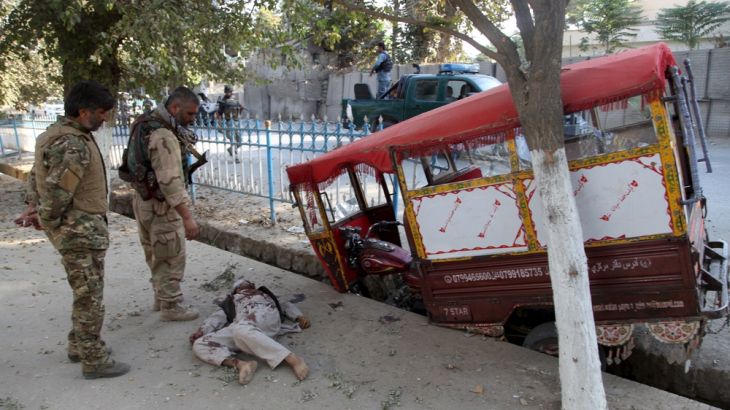Poor leadership blamed for Kunduz fall: report
Afghan inquiry into strategic city’s seizure by the Taliban concludes that security forces lacked coordination.

Poor leadership, misuse of resources and bad communication between Afghan security forces were the reasons a strategic northern city of Afghanistan briefly fell to the Taliban, an investigation has found.
Kunduz was overrun by the Taliban on September 28. The fighters held the city for three days before a government counter-offensive was launched. It took troops more than two weeks to bring the city back under government control.
Keep reading
list of 4 itemsCould shipping containers be the answer to Ghana’s housing crisis?
Are Chinese electric vehicles taking over the world?
First pig kidney in a human: Is this the future of transplants?
Amrullah Saleh, head of the investigating team and a former intelligence agency chief, said on Saturday that without US air support, the government forces would have failed to take back the city.
At a press conference, Saleh pointed to the “influence of a number of individuals” working against government interests in the city, including wealthy businessmen, local warlords and senior officials “in whose interests it was to ensure the government remained weak”.
“The collapse of Kunduz city was not due simply to a Taliban assault, it had been in the planning stages for over a year,” he added.
Related: Residents tell suffering as battle for Kunduz rages
Al Jazeera’s Jennifer Glasse, reporting from Kabul, said: “There were different security forces at the time; the army, the local police and the intelligence services had really different strategies dealing with the situation and the command structure was far too complicated.
“Some forces said they never even got the order to fire their weapons when the Taliban took over the city. It was the following day that Afghanistan asked for help from the US and without that, the Taliban would have overrun the Kunduz airport. The situation would have been worst.
“The report is a very stark message to the Afghan government about the state of the security forces”.
The fall of Kunduz has dealt a major blow to the country’s NATO-trained security forces and highlighted the rebels’ potential to expand beyond their rural strongholds.

The fighters reportedly freed almost 600 prisoners, mostly former Taliban members, from jails in the city.
Zabiullah Mujahid, the Taliban spokesman, posted a triumphant picture on Twitter purportedly showing fighters raising the group’s trademark white flag at a roundabout in the city centre.
Related: Taliban expands fight beyond Afghanistan’s Kunduz
Moreover during the counter-offensive operation, a bombing of a hospital in Kunduz belonging to Doctors Without Borders – in which at least 22 people were killed – raised wider questions as to the circumstances that led to the prominent medical charity being hit in an apparent US air strike.
Kunduz, the capital of the province of the same name, is a strategic city on the northern Afghan plain. It sits on a national crossroads that connects to every border, including Tajikistan to the north.
While it is considered a breadbasket for the country as a major wheat producing region, it is also a nexus for smuggling routes for drugs, weapons and alcohol, officials have said.